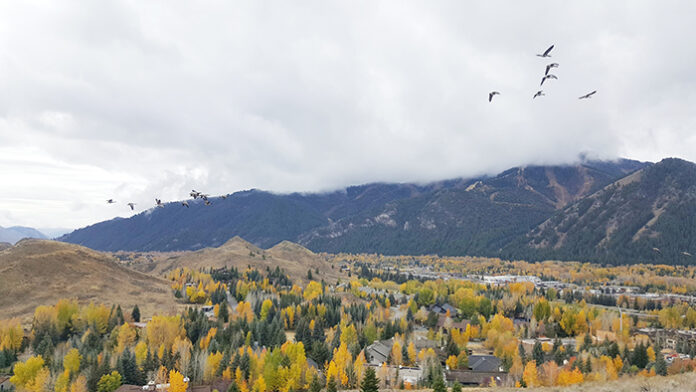BY HANNES THUM
Summer, when we are in the midst of it, can feel like the whole world. Like it is a time without end. The daily routine of sun-stoked heat and the valley winds and the dryness of the dusty sage is a rhythm that we settle into so deeply that it can be tempting to lose track of the arc of the year, to forget how much this valley changes as we move annually between summer and winter. Aside from an occasional thunderstorm or two, each day in July or August tends to feel a lot like the day before.
In October, though, summer can feel like the kind of faint dream that, upon waking, seems to move away from consciousness even as you try to remember it. I can hardly picture it, already. Did I really used to leave the house in the morning without a jacket? Was the sun really that high in the sky?
It feels like it happens fast, and it does happen fast.
There is nothing so constant as change, but that change is not consistent. At this time of year, close to the autumnal equinox in late September, the pace of change is relatively rapid. We are losing nearly three minutes of daylight each day right now—that kind of thing adds up over the course of a week. Temperatures slip down, and there’s always a storm over the horizon.
All of this results in more darkness, less solar gain, and more cold.
The colors in the changing leaves were quite stunning this year, and it is such an annual gift that we receive in this valley to be able to live in a place so ablaze with neon-bright oranges and reds and yellows. But, make no mistake—these colors are all the result of the trees grimly and sternly preparing for the dark and cold that is yet to come. This is preparation for a hibernation of sorts, but it is nothing like a warm and cozy sleep.
Autumn is a time of intense movement and preparation in the worlds of the creatures that live here.
I find myself in a lot of odd places at this time of year, wondering about signs of where these animals have been and where they are going. Tracks in the snow. The grass pressed into a round depression where elk slept under the boughs of a Douglas fir. A spray of dirt. The sudden smell on the breeze that unmistakably says “they were here” but leaves little clue of where they’ve gone.
The faint crack of a stick in the distance. Moving animals? Or just the wind?
It’s hard to say what is on the mind of the animals living outside during this time of change. We humans take note in our own way—in the fall, we might feel a transition as the mornings become colder, and we may take note of a frost and the need to cover the garden. But, the stakes are a lot lower for us. I can turn away and walk off of that windy ridge, before the oncoming storm, and head inside.
The woodpile is stacked.



